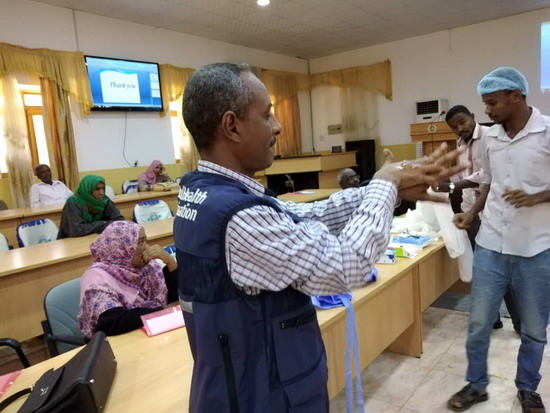Polio personnel are putting in the hours to strengthen response
 Dr Niazy trains medical staff on handwashing during a COVID-19 training session in River Nile state. Photo: WHO/Sudan
Dr Niazy trains medical staff on handwashing during a COVID-19 training session in River Nile state. Photo: WHO/Sudan
28 May 2020 – The polio eradication programme has stepped up to help the Sudanese Ministry of Health limit spread of the COVID-19 virus. The programme is working in 14 states in the country supporting COVID-19 surveillance, information dissemination and training of health workers.
Dr Niazy Abd Alhameed Abd Alwahab, a National Medical Officer for the polio programme since 2013, is one of the personnel playing a key role. He and colleagues recently led 2 WHO COVID-19 trainings in River Nile state, one for rapid response teams and one for local hospital staff, in addition to supporting training run by the State Ministry of Health.
Thanks to the training, health workers in all 7 localities in the state are ready to help individuals who are showing symptoms of COVID-19. In total, more than 3000 rapid response team members have been trained across Sudan with support from polio National Medical Officers.
By early May, River Nile state had suffered 7 cases of COVID-19, with 2 fatalities. “The state is organized to respond,” Dr Niazy explains, “All patients are being treated in dedicated isolation facilities in hospitals, and medical staff are on high alert for more cases. We helped train teams so that they are able to serve the population.”
Training rapid response teams
A 5-day training of rapid response teams, funded by WHO, was targeted at 7 teams, one from each state locality. Of the 42 individuals trained, 30 were women and 12 were men. The teams have been created for the COVID-19 response. Each team contains individuals with the collective public health experience to contribute to local efforts to fight the virus, spearheading work in contact tracing and engagement with the community.
The first day of training was attended by the Director General Health of the State Ministry of Health and the Head of the Emergency Humanitarian Assistance department.
Dr Niazy explains that over the 5 days, participants gained a comprehensive understanding of Sudan’s COVID-19 surveillance and contact tracing systems, infection prevention and control practices, case management methods, and how to collect samples and arrange shipment to the national laboratory in Khartoum. Participants were also trained on how to use PPE safely and how best to wash their hands.
“Participants were encouraged to take part in interactive exercises to test and strengthen their knowledge, as well as take part in discussions,” he says.
“By the end of the training, all participants were fully trained and able to pass on their knowledge in their localities.”
Training local health staff
The polio programme also supported a 2-day COVID-19 training for 34 women and 22 men who work in state hospitals as doctors, laboratory technicians, or other medical personnel. The programme continues to support the State Ministry of Health with further local training, including for medical registrars.
Ongoing challenges
The situation in River Nile state is very challenging. There are chronic shortages of PPE, hand sanitizer and masks, and WHO is offering urgent support to help procure these. Severe shortages of fuel and currency are making response more difficult. Social norms in some communities dissuade individuals with COVID-19 symptoms from seeking medical assistance, and work must be carried out to build trust and ensure people with COVID-19 are found and offered care.
To serve the COVID-19 response and prevent virus spread, the polio eradication programme has had to scale back some of its usual work. Dr Niazy explains, “Vaccination campaigns are paused, and many private clinics are closed, some of the public health centres are turned into isolation centres as part of the response to this emergency. This makes detecting acute flaccid paralysis (AFP) more difficult, as health personnel are trained to report children with AFP who come to the health centres.”
Efforts are being made across the Eastern Mediterranean Region to minimize the impact of COVID-19 on the overall health of populations, during a time when many health activities cannot go ahead. In Sudan, a number of children do not have full immunity against polio, and it is critical that routine immunization continues where possible until vaccination campaigns can resume.
Dr Hoda Youssef Atta, acting WHO Representative, explains, “During the COVID-19 emergency the polio eradication programme is committed to providing expertise, training and medical skills to protect Sudan. However, as soon as it is safe to do so, we must scale up programme operations once more to protect vulnerable populations from polio.”








